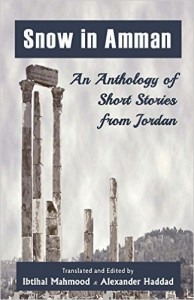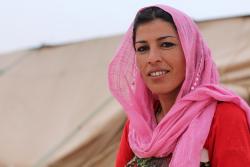This post is crossposted at the writer’s blog.
Snow in Amman: An Anthology of Short Stories is a collection of eleven contemporary short stories from Jordan translated and edited by Ibtihal Mahmoud and Alexander Hadded, with a foreword by Samir Al Sharif which provides a very brief overview of the Jordanian short story for the reader unfamiliar with the literature.
As this anthology is aimed to introduce the reader to the Jordanian short story, it could have benefited from a little more of this framing. The stories are presented without dates or biographical information. That said however, this focus on the text itself has its own advantages and pushes back against the tendency to turn to Arabic literature as a form of ethnography. There’s also no messing about with glossaries and other forms of explaining the texts – there are only two footnotes.
Mahmoud has a wonderfully succinct answer to “why Jordan”: “because this translator is from Jordan.” Noting the underrepresentation of Jordanian literature even in the Arabic literary sphere (only 3 of the 105 best Arabic language novels selected by the Arab Writers Union were from Jordan) she asks: “why not Jordanian literature?” Mahmoud makes a point of her selection of stories, seeking works that “avoided the Orientalizing influence that has become such a destructive cliche among words of Arabic fiction in translation. Enough has been said about tents and camels, virgins in veils, starry nights in the Sahara.” Instead Mahmoud sough out works with a “universal” quality that “complements, not overpowers, their distinctly Jordanian flavor.”
The anthology includes works by al Sharif, Elias Farkouh, Basma el-Nsour, Ahmed Abu Hleiwa, Magdalene Abu el-Rub, Asmaa al Mallah, Manal Hamdi, Musa Abu Rayah, Khalid Yousef Abu Tamaa,and Julnar Zain.
The translation for the most part achieves the “honest rendering” to which it aspires. There are passages that I can imagine would have been difficult to translate, but which are wonderfully translated, in each of the stories, such as this one from Abu Hleiwa: “Tradition – that unwritten, unspoken martial law – snuffled like a dog at the burned out corpse of our humanity.” Some word choices mark the difficulty of the process, such as “belle”, which with its connotations seems jarring, but I imagine it was standing in for the word “hasna’aa” and what other word could have conveyed the meaning?
One of my favourite stories is The Brass Kohl Pot by Basma El-Nsour. It’s narrated in a confessional tone by a self-described “spinster” who is resentful of the label placed upon her by society, and resists the assumption that her life is empty:
“While we are being frank with each other, let me also say that I loathe this word, ‘spinster.’ It has this macabre quality to it, at once reductive and profound, that smacks of the most depressing sort of fatalism; the kind one might reserve for an incurable disease or a state of permanent disability.”
However, it becomes clear that the unnamed narrator has been affected by society’s views of unmarried women, and is desperately looking to change her situation. There are points where it is not clear whether we are laughing with or at the narrator:
In my defense – for you see, I cannot help but defend myself against such an ugly word – I am a very pleasant spinster, certainly a burden to no one but myself. I have had a successful career. Okay…I should not say ‘successful’ as I have no achievements worth mentioning here, but I am a remarkably fast typist. And I am not boring: I enjoy reading poetry and romance novels. Hell, I even fell in love once – when was that? I cannot recall precisely, but I want to say it was maybe 20 years ago…
The tensions in this story between a single woman asserting her freedom and yet wanting to be accepted by society appear in a more allegorical form in Magdalene Abu el-Rub’s story, about a young woman who tries to escape her abusive family, and Manal Hamdi’s Stained by Roses, narrated by a lonely seamstress. While some of the stories were a little too abstract and philosophical for my taste, and a few others employed prose that was a great deal too saccharine, these three stories, like the final one by Julnar Zain, blended elements of the fairytale, the morality story, and a kind of bitter realism in unexpected ways.
Although the choice of texts is somewhat uneven, and some word choices in translation inevitably appear out of place, Snow in Amman is a great introduction to the Jordanian short story. I’m certainly going to go look for more work by some of the writers and would love to see a longer anthology.


